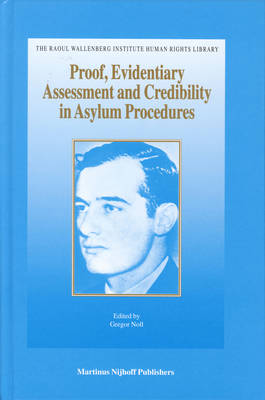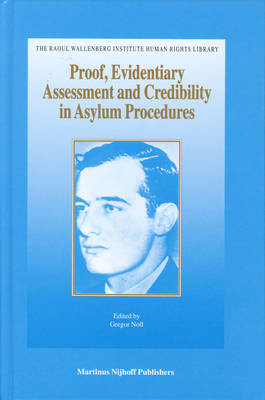
Bedankt voor het vertrouwen het afgelopen jaar! Om jou te bedanken bieden we GRATIS verzending (in België) aan op alles gedurende de hele maand januari.
- Afhalen na 1 uur in een winkel met voorraad
- Gratis thuislevering in België vanaf € 30
- Ruim aanbod met 7 miljoen producten
Bedankt voor het vertrouwen het afgelopen jaar! Om jou te bedanken bieden we GRATIS verzending (in België) aan op alles gedurende de hele maand januari.
- Afhalen na 1 uur in een winkel met voorraad
- Gratis thuislevering in België vanaf € 30
- Ruim aanbod met 7 miljoen producten
Zoeken
Proof, Evidentiary Assessment and Credibility in Asylum Procedures
Noll Gregor
€ 209,42
+ 418 punten
Omschrijving
Today, a majority of asylum cases are arguably decided on the basis of evidentiary assessment rather than issues of material law. Although the EU-wide Common European Asylum System purports to harmonise domestic practices at a minimum level, it fails to offer remedies for this crucial issue, which poses challenges for practitioners and academics alike. Without a coherent approach to evidentiary assessment, asylum law will remain fragmented and open to discretionary excess.
Up to now, academic research has not addressed issues of proof and credibility in the asylum procedure to an extent reflecting its practical importance. This edited volume attempts to fill the void. Academic experts on the theory of evidence, international criminal law, human rights law, refugee law, sociology of law and psychology have contributed chapters exploring both empirical and normative dimensions of evidentiary assessment. Drawing on the results of a 12-month research project within the framework of the Refugee Research Programme and of three interdisciplinary expert conferences held at the Danish Centre for Human Rights, Copenhagen, the Institute for International Integration Studies, Dublin, and the Faculty of Law, Lund, this volume sets new parameters for an informed debate on evidence in asylum cases.
Up to now, academic research has not addressed issues of proof and credibility in the asylum procedure to an extent reflecting its practical importance. This edited volume attempts to fill the void. Academic experts on the theory of evidence, international criminal law, human rights law, refugee law, sociology of law and psychology have contributed chapters exploring both empirical and normative dimensions of evidentiary assessment. Drawing on the results of a 12-month research project within the framework of the Refugee Research Programme and of three interdisciplinary expert conferences held at the Danish Centre for Human Rights, Copenhagen, the Institute for International Integration Studies, Dublin, and the Faculty of Law, Lund, this volume sets new parameters for an informed debate on evidence in asylum cases.
Specificaties
Betrokkenen
- Auteur(s):
- Uitgeverij:
Inhoud
- Aantal bladzijden:
- 233
- Taal:
- Engels
- Reeks:
- Reeksnummer:
- nr. 16
Eigenschappen
- Productcode (EAN):
- 9789004140653
- Verschijningsdatum:
- 7/06/2005
- Uitvoering:
- Hardcover
- Formaat:
- Genaaid
- Afmetingen:
- 173 mm x 243 mm
- Gewicht:
- 576 g

Alleen bij Standaard Boekhandel
+ 418 punten op je klantenkaart van Standaard Boekhandel
Beoordelingen
We publiceren alleen reviews die voldoen aan de voorwaarden voor reviews. Bekijk onze voorwaarden voor reviews.









